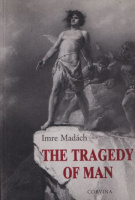categories
- Traffic and Vehicles Catalogue
- socreal.catalog
- Advertisement Catalogue
- Photo Catalogue
- Chinese and Japanese Catalogue
- New Holy Card Catalogue II.
- 12 interesting old books
 Books
Books
 Bibliophil
Bibliophil
 Antiques
Antiques
 Engraving
Engraving
 Maps
Maps
 Photos
Photos
 Antique Papers, Small Prints
Antique Papers, Small Prints
 Posters
Posters
- Circus
- Modern Graphics
- Socialist Realism
- NER Propaganda
- Others
cart
Cart is empty
You've not logged in
Madách Imre : The Tragedy of Man
- description
- additional information
Translated from the Hungarian by George Szirtes.
Introduction by George F. Cushing.
Illustrations by Mihály Zichy.
"The Tragedy of Man is the most controversial work in the long history of Hungarian literature. When it was first published in 1862, it was hailed as a great achievement, but at the same time it-gave rise to a multitude of questions, both literary and philosophical, that have been fiercely debated ever since. It is also one of the most surprising works in Hungarian: it appeared suddenly from the pen of an unknown author and had no obvious antecedents in the Hungarian literary tradition. Moreover, there is nothing, apart from a passing reference(...), to brand it as Hungarian - a unique phenomenon at a time when Madách's contemporaries were agonising over the failure of the revolution of 1848 and its repercussions on national life and expectations. How then did a Hungarian country gentleman who spent most of his short life at home and rarely travelled outside his native country come to write a dramatic poem that takes its place in a broad European tradition represented by such giant figures as Milton, Goethe, Byron and Ibsen?" Illustrations by "The Tragedy of Man is the most controversial work in the long history of Hungarian literature. When it was first published in 1862, it was hailed as a great achievement, but at the same time it-gave rise to a multitude of questions, both literary and philosophical, that have been fiercely debated ever since. It is also one of the most surprising works in Hungarian: it appeared suddenly from the pen of an unknown author and had no obvious antecedents in the Hungarian literary tradition. Moreover, there is nothing, apart from a passing reference(...), to brand it as Hungarian - a unique phenomenon at a time when Madách's contemporaries were agonising over the failure of the revolution of 1848 and its repercussions on national life and expectations. How then did a Hungarian country gentleman who spent most of his short life at home and rarely travelled outside his native country come to write a dramatic poem that takes its place in a broad European tradition represented by such giant figures as Milton, Goethe, Byron and Ibsen?"
Introduction by George F. Cushing.
Illustrations by Mihály Zichy.
"The Tragedy of Man is the most controversial work in the long history of Hungarian literature. When it was first published in 1862, it was hailed as a great achievement, but at the same time it-gave rise to a multitude of questions, both literary and philosophical, that have been fiercely debated ever since. It is also one of the most surprising works in Hungarian: it appeared suddenly from the pen of an unknown author and had no obvious antecedents in the Hungarian literary tradition. Moreover, there is nothing, apart from a passing reference(...), to brand it as Hungarian - a unique phenomenon at a time when Madách's contemporaries were agonising over the failure of the revolution of 1848 and its repercussions on national life and expectations. How then did a Hungarian country gentleman who spent most of his short life at home and rarely travelled outside his native country come to write a dramatic poem that takes its place in a broad European tradition represented by such giant figures as Milton, Goethe, Byron and Ibsen?" Illustrations by "The Tragedy of Man is the most controversial work in the long history of Hungarian literature. When it was first published in 1862, it was hailed as a great achievement, but at the same time it-gave rise to a multitude of questions, both literary and philosophical, that have been fiercely debated ever since. It is also one of the most surprising works in Hungarian: it appeared suddenly from the pen of an unknown author and had no obvious antecedents in the Hungarian literary tradition. Moreover, there is nothing, apart from a passing reference(...), to brand it as Hungarian - a unique phenomenon at a time when Madách's contemporaries were agonising over the failure of the revolution of 1848 and its repercussions on national life and expectations. How then did a Hungarian country gentleman who spent most of his short life at home and rarely travelled outside his native country come to write a dramatic poem that takes its place in a broad European tradition represented by such giant figures as Milton, Goethe, Byron and Ibsen?"
| condition: |      |
| category: | Books > Foreign Language Books > Books in English > |
| category: | Books > Literature > Drama > |
| publisher: | Corvina, (1995) |
| item number / ISBN: | 9789631339949 |
| binding: | paperback |
| pages: | 269, [2] |
| language: | English |



























































 Telefon:
Telefon: E-mail:
E-mail:







